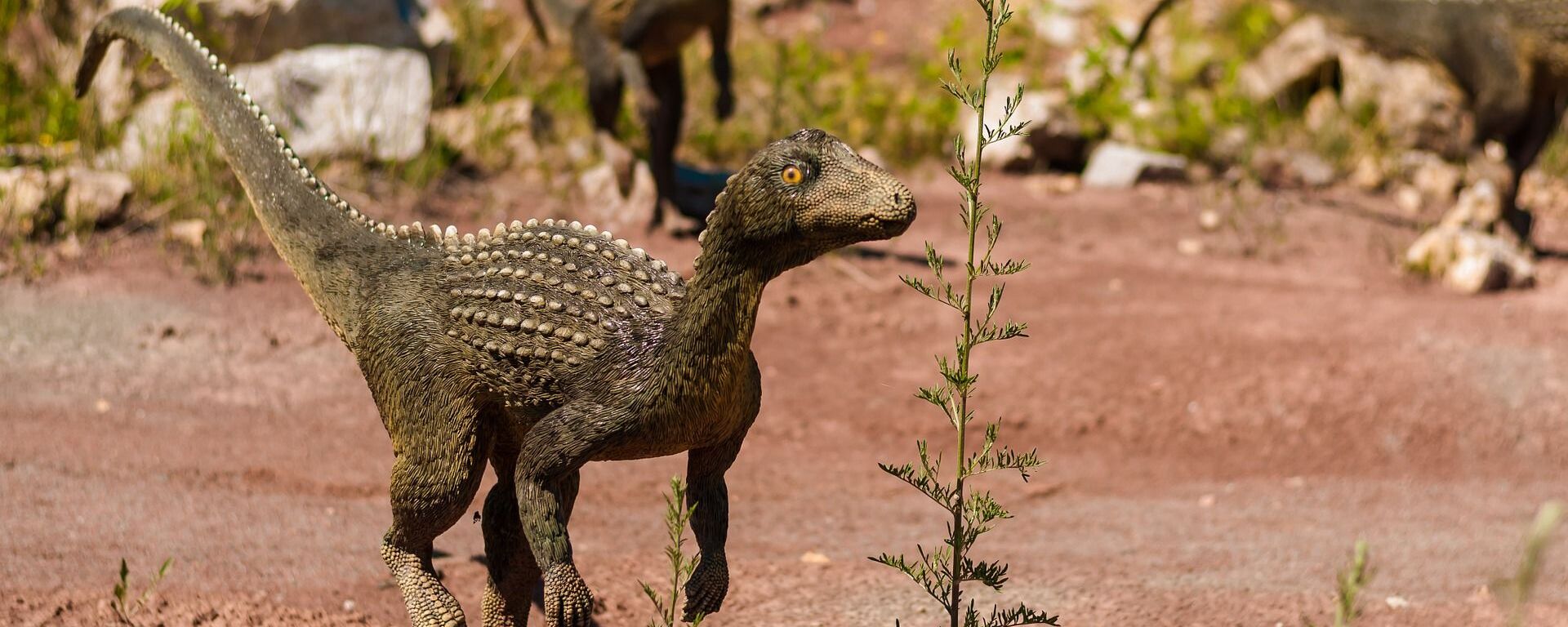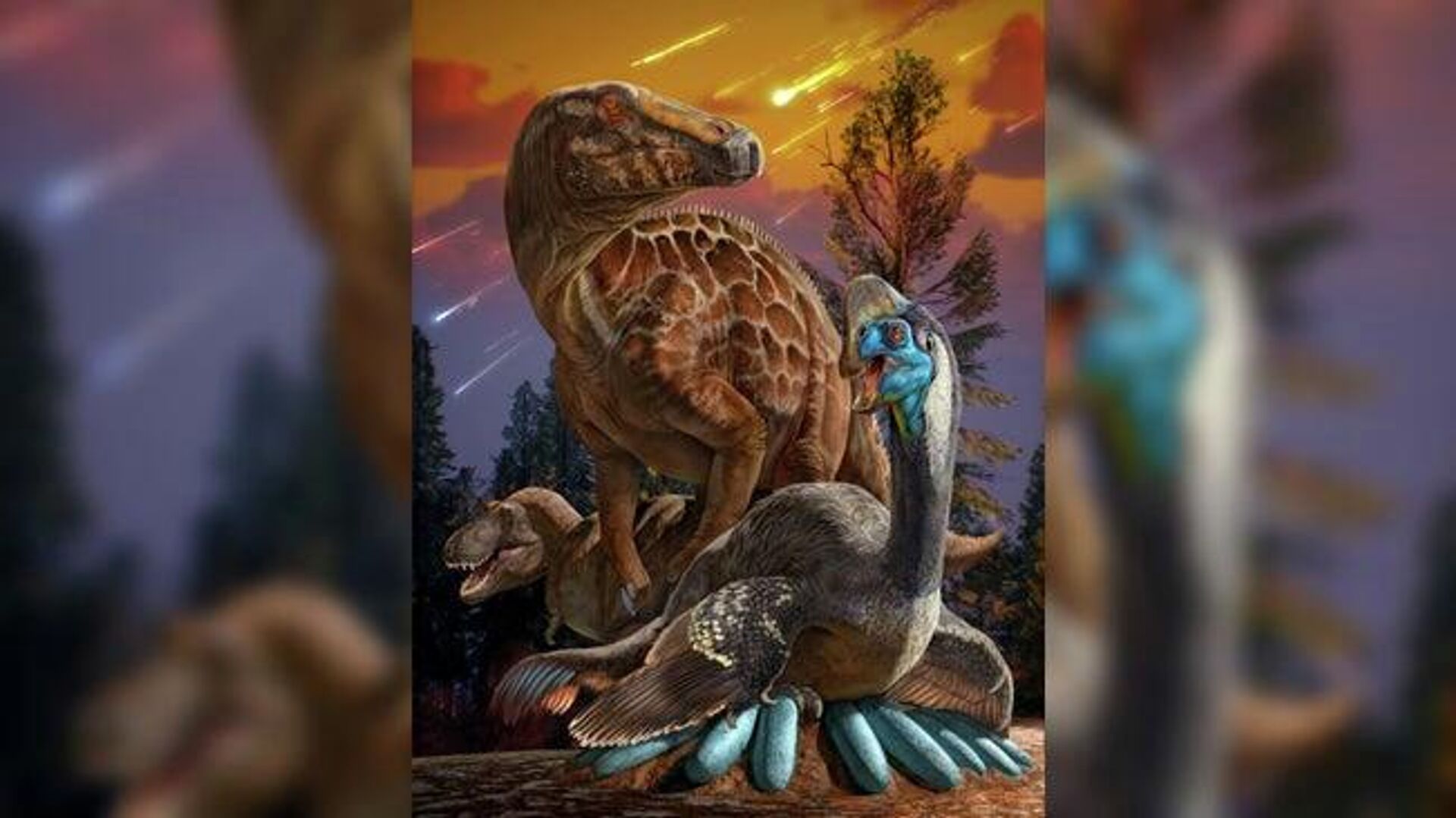https://sputnikglobe.com/20220921/dinosaurs-were-in-long-term-decline-before-giant-asteroid-strike-new-study-claims-1101052292.html
Dinosaurs Were in ‘Long-Term Decline’ Before Giant Asteroid Strike, New Study Claims
Dinosaurs Were in ‘Long-Term Decline’ Before Giant Asteroid Strike, New Study Claims
Sputnik International
Paleontologists from all across the world continue to lock horns over what caused the sudden extinction of dinosaurs on our planet 66 million years ago, with... 21.09.2022, Sputnik International
2022-09-21T14:34+0000
2022-09-21T14:34+0000
2025-04-07T11:04+0000
china
dinosaurs
study
asteroid
extinction
scientists
researchers
viral news
https://cdn1.img.sputnikglobe.com/img/07e6/09/15/1101049164_0:0:651:366_1920x0_80_0_0_5e97b722700a3c89d5e4a8b426d36a1f.jpg
Dinosaurs were already in decline before becoming extinct 66 million years ago, purportedly due to the impact of a giant asteroid that hit what is modern-day Mexico, a new study has revealed.The asteroid theory is one of the versions paleontologists offer in order to explain the sudden end of the reign of the dinosaurs.In the study, published in the US peer-reviewed journal PNAS, researchers from the Chinese Academy of Sciences pointed out that they had studied more than 1,000 well-preserved fossilized dinosaur eggs and eggshells discovered in China’s southern and eastern regions.According to paleontologists, the eggshells belonged to just three species – Macroolithus yaotunensis, Elongatoolithus elongatus, and Stromatoolithus pinglingensis.Nonetheless, scientists added that the eggs helped them suggest that before the estimated ten km-wide (6.2 mile) asteroid struck Earth, the animals were already not in their prime, possibly as a result of climate change.They added that “these factors may have led to ecosystem-wide instability, thus making non-bird dinosaurs vulnerable to mass extinction coincident with the asteroid impact.”Lead author Wang Qiang, an associate researcher at the Institute of Vertebrate Palaeontology and Palaeoanthropology of the Chinese Academy of Sciences, told the South Morning China Post that dinosaurs ultimately lost the ability to adapt to and recover from sudden changes in the environment.In 2020, a study conducted by Yale University argued that volcanic activity in the Deccan Traps did not play a role in the dinosaur die-off, and that the meteorite impact alone led to the extinction of the ancient reptiles.
https://sputnikglobe.com/20220812/researchers-discover-first-of-its-kind-armored-dinosaur-fossils-in-argentina-1099502018.html
china
Sputnik International
feedback@sputniknews.com
+74956456601
MIA „Rossiya Segodnya“
2022
Oleg Burunov
https://cdn1.img.sputnikglobe.com/img/07e4/09/0b/1080424846_0:0:2048:2048_100x100_80_0_0_3d7b461f8a98586fa3fe739930816aea.jpg
Oleg Burunov
https://cdn1.img.sputnikglobe.com/img/07e4/09/0b/1080424846_0:0:2048:2048_100x100_80_0_0_3d7b461f8a98586fa3fe739930816aea.jpg
News
en_EN
Sputnik International
feedback@sputniknews.com
+74956456601
MIA „Rossiya Segodnya“
Sputnik International
feedback@sputniknews.com
+74956456601
MIA „Rossiya Segodnya“
Oleg Burunov
https://cdn1.img.sputnikglobe.com/img/07e4/09/0b/1080424846_0:0:2048:2048_100x100_80_0_0_3d7b461f8a98586fa3fe739930816aea.jpg
china, dinosaurs, study, asteroid, extinction, scientists, researchers, viral news
china, dinosaurs, study, asteroid, extinction, scientists, researchers, viral news
Dinosaurs Were in ‘Long-Term Decline’ Before Giant Asteroid Strike, New Study Claims
14:34 GMT 21.09.2022 (Updated: 11:04 GMT 07.04.2025) Paleontologists from all across the world continue to lock horns over what caused the sudden extinction of dinosaurs on our planet 66 million years ago, with some pointing to massive volcanic eruptions in India.
Dinosaurs were already in decline before becoming extinct 66 million years ago, purportedly due to the impact of a giant asteroid that hit what is modern-day Mexico, a new study has revealed.
The asteroid theory is one of the versions paleontologists offer in order to explain the sudden end of the reign of the dinosaurs.
In the study, published in the US peer-reviewed journal PNAS, researchers from the Chinese Academy of Sciences pointed out that they had studied more than 1,000 well-preserved fossilized dinosaur eggs and eggshells discovered in China’s southern and eastern regions.
According to paleontologists, the eggshells belonged to just three species – Macroolithus yaotunensis, Elongatoolithus elongatus, and Stromatoolithus pinglingensis.

12 August 2022, 07:04 GMT
Nonetheless, scientists added that the eggs helped them suggest that before the estimated ten km-wide (6.2 mile) asteroid struck Earth, the animals were already not in their prime, possibly as a result of climate change.
“This worldwide, long-term decline in dinosaur diversity through the end of the Cretaceous Period and sustained low number of dinosaur lineages for the last few million years may have resulted from known global climate fluctuations and massive volcanic eruptions, i.e., from the Deccan Traps [province] in India,” scientists argued.
They added that “these factors may have led to ecosystem-wide instability, thus making non-bird dinosaurs vulnerable to mass extinction coincident with the asteroid impact.”
Lead author Wang Qiang, an associate researcher at the Institute of Vertebrate Palaeontology and Palaeoanthropology of the Chinese Academy of Sciences, told the South Morning China Post that dinosaurs ultimately lost the ability to adapt to and recover from sudden changes in the environment.
“Dinosaurs went extinct gradually over millions of years, instead of coming to an abrupt end from sudden disasters,” he asserted.
In 2020, a study conducted by Yale University argued that volcanic activity in the Deccan Traps did not play a role in the dinosaur die-off, and that the meteorite impact alone led to the extinction of the ancient reptiles.



